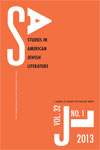
Studies in American Jewish Literature
Scope & Guideline
Connecting Heritage and Modernity in Jewish Literature
Introduction
Aims and Scopes
- Exploration of Jewish Identity and Culture:
The journal investigates how Jewish identity and culture are represented and negotiated in American literature, providing insights into the complexities of diaspora experiences. - Focus on Contemporary Jewish Literature:
There is a significant emphasis on contemporary Jewish authors and their works, examining how modern themes such as feminism, race, and identity politics are intertwined with Jewish narratives. - Interdisciplinary Approaches:
The journal encourages interdisciplinary methodologies, inviting contributions from literary studies, cultural studies, history, and sociology to enrich the understanding of American Jewish literature. - Critical Analyses of Historical Contexts:
Scholarly articles often contextualize literary works within historical frameworks, examining how past events, such as the Holocaust and immigration, shape the narratives and themes present in Jewish literature. - Discussion of Genre Evolution:
The journal highlights the evolution of literary genres, particularly the intersections between fiction, nonfiction, and essay writing, as seen in the works of prominent Jewish authors.
Trending and Emerging
- Feminism and Gender Studies:
There is a growing focus on feminist perspectives and gender studies within Jewish literature, highlighting the voices and experiences of Jewish women writers and the complexities of gender identity. - Intersectionality and Multiculturalism:
Recent articles emphasize the importance of intersectionality, exploring how Jewish identity intersects with race, sexuality, and other cultural identities, thus broadening the discourse around Jewish literature. - Post-Nostalgia and Memory Studies:
Emerging themes around post-nostalgia and collective memory are becoming prominent, particularly in relation to how contemporary authors grapple with historical trauma and its implications for identity. - Queer Representation in Jewish Literature:
There is an increasing interest in queer narratives within Jewish literature, reflecting broader societal changes and the need to address LGBTQ+ identities within the Jewish community. - Cultural Hybridity and Diaspora Experiences:
The exploration of cultural hybridity and the multifaceted experiences of Jewish diasporas in America is gaining traction, providing new insights into the complexities of identity formation.
Declining or Waning
- Traditional Historical Narratives:
There is a noticeable decline in articles focusing on traditional historical narratives of Jewish literature, as contemporary scholarship increasingly prioritizes modern interpretations and lived experiences. - Singular Author Studies:
The focus on in-depth studies of singular authors, while still present, is diminishing in favor of broader thematic analyses that draw connections between multiple authors and cultural contexts. - Static Representations of Jewish Identity:
Contributions that present static or monolithic views of Jewish identity are less frequent, as the discourse shifts towards more dynamic and intersectional understandings of identity. - Limited Engagement with Non-Western Jewish Literature:
The engagement with non-Western Jewish literature and perspectives appears to be receding, as the journal increasingly concentrates on American Jewish narratives.
Similar Journals

JOURNAL OF JEWISH THOUGHT & PHILOSOPHY
Navigating the Rich Tapestry of Jewish Thought and CultureThe JOURNAL OF JEWISH THOUGHT & PHILOSOPHY, published by BRILL, stands as a significant academic resource since its inception in 1993. With the ISSN 1053-699X, this interdisciplinary journal uniquely bridges various fields including Literature and Literary Theory, Philosophy, and Religious Studies, providing a platform for rigorous exploration of Jewish intellectual traditions and their broader cultural implications. Holding esteemed rankings across multiple categories, including Q1 in Literature and Literary Theory and Q2 in Philosophy, the journal appeals to researchers and scholars worldwide. The journal is not open access but is available through numerous academic libraries, making it accessible to those dedicated to advancing knowledge in Jewish thought. By fostering critical discourse and innovative scholarship, it remains an essential resource for understanding complex intersections of faith, ethics, and society from a Jewish perspective.
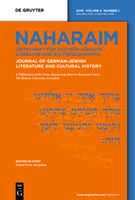
Naharaim
Fostering Innovative Research in Near Eastern StudiesNaharaim is a distinguished academic journal dedicated to fostering interdisciplinary scholarship in the field of Near Eastern studies. Published by Walter de Gruyter GmbH, this journal aims to provide a platform for innovative research that explores the rich historical, cultural, and social dynamics of the region. With an ISSN of 1862-9148 and an E-ISSN of 1862-9156, Naharaim adheres to high academic standards, although it does not currently offer open access options. The journal aspires to engage a global audience of researchers, professionals, and students eager to contribute to and gain insights from the evolving discourse surrounding Near Eastern cultures and histories. Through rigorous peer-reviewed articles, Naharaim plays a vital role in advancing knowledge and understanding in a field of study that is increasingly relevant in today’s interconnected world.

Journal for the Study of Judaism
Connecting Past and Present in Jewish StudiesJournal for the Study of Judaism, published by BRILL, serves as a vital platform for scholarly discourse in the fields of History, Literature and Literary Theory, and Religious Studies. With a commendable impact factor and ranking in the Q2 and Q3 quartiles across its respective categories, this journal facilitates high-quality research that explores the multi-faceted dimensions of Jewish studies from its inception in 1970 to the present day. For those who engage with the journal, the commitment to rigorous peer-review processes ensures publication of significant articles that advance knowledge and foster discussions within the academic community. As an essential resource for researchers, professionals, and students alike, the journal continues to enrich the understanding of Judaism through esteemed contributions of scholarship and critical analysis. The journal’s rich legacy and commitment to excellence make it an indispensable tool for those seeking to deepen their insight into Jewish studies and its broader implications.
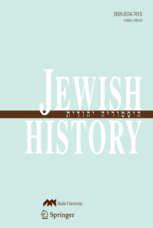
Jewish History
Unveiling the Depths of Jewish Cultural ExperiencesJewish History is a significant academic journal published by Springer, focusing on the multifaceted historical narratives of Jewish communities worldwide. With roots tracing back to 1986, this esteemed journal offers an intellectual platform where researchers and scholars can engage critically with the vast and rich tapestry of Jewish heritage, culture, and experiences. Although it operates under a traditional subscription model, the journal has gained a notable standing in recent years, achieving a Q4 ranking in Cultural Studies and a Q3 ranking in History for 2023, reflecting its robust scholarly contributions. The journal is indexed in Scopus, with a rank of #808 in Arts and Humanities History and #754 in Social Sciences Cultural Studies, placing it within the competitive landscape of academic publishing. Its commitment to advancing the field of Jewish studies makes it an essential resource for researchers, professionals, and students alike, who seek to deepen their understanding of Jewish history from historical, cultural, and social perspectives.

Jewish Historical Studies-Transactions of the Jewish Historical Society of England
Celebrating the Legacy and Future of Jewish CommunitiesJewish Historical Studies - Transactions of the Jewish Historical Society of England is a premier scholarly journal dedicated to advancing the understanding of Jewish history in its diverse contexts. Published by UCL PRESS, this open access journal has been freely accessible since 2015, providing an invaluable resource for researchers, educators, and students alike. With an ISSN of 0962-9696 and E-ISSN 2397-1290, it features a wide variety of articles that delve into topics related to the historical, cultural, and societal aspects of Jewish communities. Located at University College London, the journal is committed to fostering interdisciplinary insights and encouraging critical discourse within Jewish studies. Its dedication to open access amplifies the visibility and dissemination of high-quality research, ensuring that vital scholarship reaches a global audience. As a vital platform for sharing cutting-edge research, Jewish Historical Studies plays a crucial role in the ongoing dialogue regarding Jewish history, heritage, and identity.

Arquivo Maaravi-Revista Digital de Estudos Judaicos da UFMG
Fostering Dialogue in Jewish ScholarshipArquivo Maaravi-Revista Digital de Estudos Judaicos da UFMG is a distinguished open-access journal dedicated to the field of Jewish Studies, published by the Universidade Federal de Minas Gerais (UFMG). With an ISSN of 1982-3053, the journal has been serving the academic community since 2007, facilitating the dissemination of research and scholarship in Jewish cultural, historical, and religious studies. Situated in the vibrant academic landscape of Brazil, the journal aims to foster dialogue among researchers, professionals, and students, providing a platform for innovative and critical perspectives. Although the H-Index and specific Scopus ranks are not available, the journal's commitment to academic rigor and open access ensures that its content reaches a broad audience, empowering researchers and enriching the field of Jewish studies worldwide. The journal is based at FAC Ciências Econômicas, Av. Antonio Carlos, 6627, Belo Horizonte MG 31270-901, Brazil, making it an integral part of the UFMG's academic ecosystem.
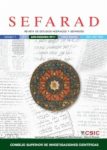
SEFARAD
Fostering Interdisciplinary Dialogue Across CulturesSEFARAD, published by the CONSEJO SUPERIOR INVESTIGACIONES CIENTIFICAS-CSIC, is a renowned open-access journal that has been a pivotal platform for scholarly communication since its inception in 1996. Based in Spain, it caters to a diverse readership across multiple disciplines, including Cultural Studies, History, Literature and Literary Theory, Religious Studies, and Linguistics and Language. The journal has successfully established itself within respected academic circles, achieving Q2 rankings in both History and Literature and Literary Theory as per the 2023 category quartiles, emphasizing its significance in these fields. With a commitment to fostering interdisciplinary dialogue and enhancing understanding of the Jewish heritage and culture in the Iberian Peninsula, SEFARAD presents original research articles, comprehensive reviews, and critical essays that inspire further scholarly inquiry. Researchers, professionals, and students alike will find this journal an invaluable resource for contemporary studies in its vibrant subject areas.

JEWISH SOCIAL STUDIES
Illuminating the past, present, and future of Jewish social thought.Jewish Social Studies is a prominent peer-reviewed journal published by Indiana University Press, dedicated to advancing the field of Jewish scholarship through interdisciplinary exploration and critical inquiry. With an ISSN of 0021-6704 and an E-ISSN of 1527-2028, this journal has become a vital resource for researchers and scholars, achieving Q2 rankings in both History and Religious Studies, as well as strong standings in Anthropology and Cultural Studies. The journal bridges the gaps between diverse academic disciplines, focusing on the multifaceted dimensions of Jewish life, culture, and history, making it essential reading for anyone engaged in the study of Judaism. Although it does not currently offer Open Access options, the journal promotes a wealth of rigorous research, critical perspectives, and in-depth analyses that contribute significantly to the understanding of Jewish Studies from 1975 to the present day, with ongoing issues scheduled until 2024. With an established audience of scholars, professionals, and students, Jewish Social Studies remains a leading platform for intellectual discourse and scholarly exchange in the humanities.

NEW GERMAN CRITIQUE
Exploring the Frontiers of German Studies and Cultural TheoryNEW GERMAN CRITIQUE is a prominent academic journal published by Duke University Press, focusing on the dynamic intersections of German studies, cultural theory, and social thought. With its ISSN 0094-033X and E-ISSN 1558-1462, this journal facilitates a critical dialogue within the Arts and Humanities and Cultural Studies fields. As a Q3-ranked journal in both categories as of 2023, it represents a significant platform for scholars exploring contemporary issues through a German lens, addressing themes of identity, memory, and cultural politics. Although NEW GERMAN CRITIQUE is not an open-access journal, it remains a crucial resource for researchers, professionals, and students interested in the evolving landscape of cultural studies, inviting contributions that foster innovative perspectives and facilitate intellectual exchange. Founded in 1988 and continuing its vital discourse into 2024, the journal is headquartered in Durham, North Carolina, and serves as a touchstone for those engaged in the complexities of modern German culture and its global implications.
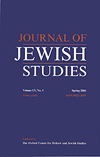
JOURNAL OF JEWISH STUDIES
Connecting Past Narratives to Present InsightsJOURNAL OF JEWISH STUDIES, published by the Oxford Centre for Hebrew and Jewish Studies, stands as a distinguished platform for scholarly discourse in the fields of Jewish history, culture, literature, and religious studies. With its ISSN 0022-2097, this journal is recognized for its significant contributions to understanding Jewish heritage and thought, achieving commendable rankings in various categories, including Q1 in Literature and Literary Theory and Q2 in History and Cultural Studies, as of 2023. The journal fosters rigorous academic engagement and encourages researchers and scholars worldwide to explore the complexities of Jewish identity and its interconnections with broader historical narratives. Operating without an open access model, it nonetheless ensures a wide reach through its well-regarded reputation, making it an essential resource for anyone invested in Jewish studies. With a publication history spanning from 2002 to 2024, the journal continues to serve as an invaluable repository of knowledge and insight for students, researchers, and professionals alike.